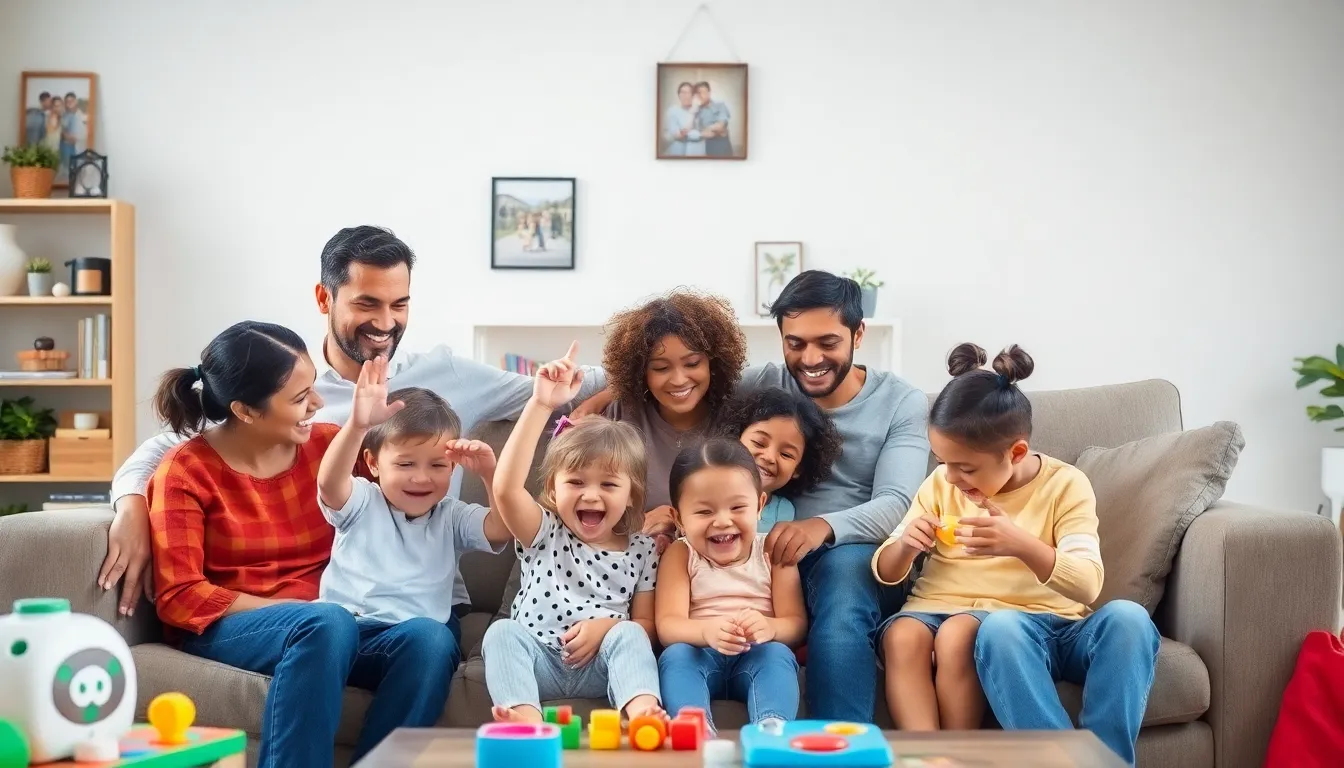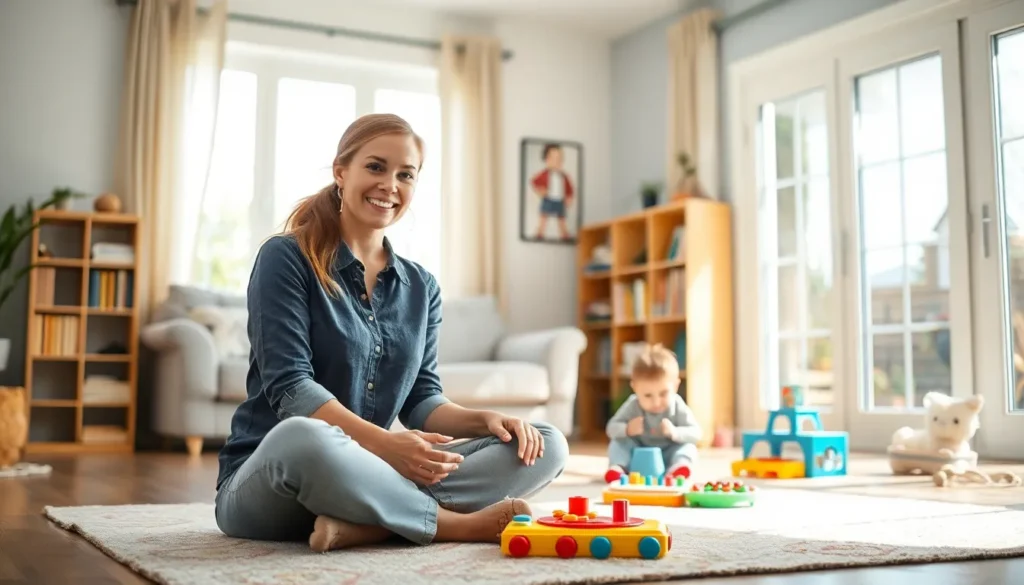Table of Contents
ToggleParenting isn’t what it used to be, and thank goodness for that! Gone are the days when a parent’s best advice was simply “because I said so.” Today’s parents are navigating a whirlwind of trends that make them part detective, part life coach, and sometimes even part therapist. With the rise of technology and a deeper understanding of child development, parenting has evolved into a fascinating blend of science, art, and a sprinkle of chaos.
Understanding Parenting Evolution Trends
Parenting has evolved significantly in recent decades. Traditional views of parenting focused primarily on authority, but today’s parents adopt diverse roles that include detective, life coach, and therapist. Research into child development influences these changes, guiding parents toward a more informed approach.
Technology also plays a critical role in shaping parenting styles. Parents often rely on apps and online forums for advice and support. Access to information enables them to make informed decisions regarding their children’s wellbeing. Many utilize social media to connect with other parents, creating a community that shares experiences and resources.
Cultural shifts contribute to the transformation of parenting practices. Modern parents prioritize emotional intelligence and communication over strict discipline. They often emphasize the importance of nurturing self-esteem and resilience in their children. Various parenting styles, such as attachment parenting and positive discipline, reflect these evolving values.
The impact of education extends beyond formal settings. Parents seek out workshops and courses to enhance their skills, demonstrating a commitment to continuous improvement. This dedication creates a blend of science and art in parenting, where instincts balance with informed choices.
Flexibility remains essential in contemporary parenting. The unpredictability of each child’s needs requires adaptability. By embracing change, parents cultivate a supportive environment tailored to their child’s unique personality and challenges. Thus, understanding these trends can help parents navigate the complexities of raising children in today’s world.
Historical Overview of Parenting Styles

Parenting styles have shifted significantly over time, evolving from rigid authority figures to more collaborative roles. Understanding these transitions highlights how perceptions of child-rearing have changed.
Traditional Parenting Methods
Traditional methods focused on obedience and respect for authority. Parents dictated rules, placing emphasis on discipline and conformity. Children were expected to comply without question, leading to a strict, hierarchical family structure. These approaches prioritized obedience over emotional connection, fostering a culture where communication often took a back seat. Heavy reliance on established norms defined family expectations, where deviation from the norm faced resistance.
Modern Parenting Approaches
Modern parents embrace a more flexible and supportive approach. They emphasize open communication and emotional intelligence, nurturing children’s individuality and self-expression. Parental roles now include being guides and partners in their children’s lives, allowing for shared decision-making and exploration. Awareness of child development principles influences parenting practices, promoting resilience and problem-solving skills. This approach recognizes that each child has unique needs, requiring adaptability and responsiveness to ensure emotional well-being. Increased access to resources enables parents to blend instinct with informed practices, fostering a supportive environment for growth.
Influencing Factors in Parenting Evolution
Numerous factors contribute to the evolution of parenting today. Cultural shifts and technological advancements play significant roles.
Cultural Shifts
Changing societal norms influence parenting styles. Recent generations prioritize emotional intelligence and open communication over strict discipline. Many parents now focus on nurturing self-esteem and resilience, fostering a deeper emotional connection with their children. Increased awareness of mental health encourages parents to adopt supportive and flexible strategies. Furthermore, modern families embrace diverse structures, reflecting a broader understanding of family dynamics. Parents frequently participate in workshops, seeking guidance on building strong relationships. This emphasis on collaboration instead of authority showcases a significant shift in how parents relate to their children.
Technological Advancements
Access to technology greatly impacts parenting practices. Parents rely on apps and online forums for advice, creating supportive communities for shared experiences. Digital platforms provide valuable resources, enabling parents to stay informed about child development. Many use tools to track developmental milestones, ensuring their approaches align with their child’s needs. Information at their fingertips helps parents enhance their skills, blending instinct with knowledge. Flexibility in adapting to technological innovations allows parents to create enriched environments tailored to their child’s unique personality. This reliance on technology represents a transformative element in modern parenting trends.
Contemporary Parenting Trends
Modern parenting trends reveal a significant shift toward nurturing approaches that emphasize emotional intelligence and communication. Parents today embrace various parenting styles while adapting to their children’s needs.
Authoritative Parenting
Authoritative parenting gains traction as a balanced approach that combines structure with emotional support. Parents guide their children using reasoning and open dialogue, encouraging independence while maintaining clear expectations. Studies show that children raised in authoritative households often exhibit higher self-esteem and social skills. Parents now prioritize fostering resilience and critical thinking, equipping children with essential life skills. This method appreciates the importance of emotional well-being, leading to healthier parent-child relationships.
Co-Parenting Models
Co-parenting models emerge in diverse family structures, promoting cooperation and shared responsibilities. Parents in these arrangements emphasize communication and teamwork to create stable environments for their children. Effectiveness increases when both parents prioritize their children’s emotional needs, regardless of their relationship status. Many co-parents benefit from establishing clear boundaries and consistent parenting strategies. This trend reflects the shifting societal norms, acknowledging that collaboration enhances children’s well-being and security across various family dynamics.
Impact of Parenting Evolution on Children
Parenting evolution significantly influences children’s development, shaping their emotional and social skills in today’s society.
Emotional Development
Modern parenting practices emphasize emotional intelligence, fostering resilience in children. Parents prioritize open communication, encouraging kids to express feelings without fear. Research indicates children raised in supportive environments develop higher self-esteem, which correlates with better mental health outcomes. With access to resources, parents learn effective techniques for nurturing emotional growth. Workshops and courses equip them to recognize their child’s emotional needs and respond appropriately. The focus on emotional well-being contributes to healthier relationships and allows children to navigate challenges more effectively.
Social Behavior
Shifts in parenting styles positively affect children’s social behavior. Collaborative approaches promote teamwork, allowing children to engage in cooperative play and build friendships. Emotional validation from parents leads to greater empathy and understanding in social interactions. Cooperative models, such as co-parenting, demonstrate how shared responsibilities enhance emotional security. Studies show that attachment to supportive caregivers encourages pro-social behavior, enabling children to form meaningful connections. A focus on open dialogue cultivates strong communication skills, essential for healthy relationships throughout life.
The evolution of parenting reflects a profound transformation in how parents engage with their children. As they embrace new methods and insights, the focus shifts toward nurturing emotional intelligence and fostering open communication. This modern approach not only supports children’s growth but also strengthens family bonds.
By adapting to cultural changes and leveraging technology, parents are better equipped to meet their children’s unique needs. The emphasis on collaboration and flexibility allows for a more supportive environment that encourages resilience and self-expression. As parenting continues to evolve, these trends will undoubtedly shape the future of family dynamics and child development.







